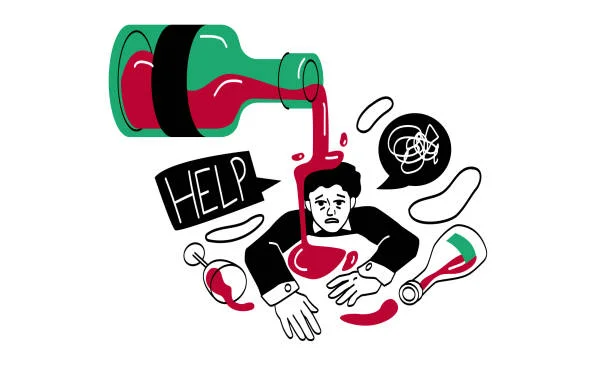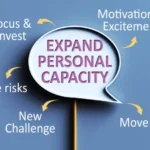Imagine this: Sarah finishes a difficult day of work and stops to get a drink. The drink calms her nerves almost immediately. She does feel the stress of the day melt away. But when she wakes up the next morning, worry comes crashing back even stronger than before. This cycle traps so many, and while alcohol may seem like a short-term and easy solution, research shows it often negatively impacts mental health over time. It is estimated that one in five adults diagnosed with a mental illness also has an alcohol use disorder. This article will help you understand how many ways alcohol can impact your mood, thinking and brain. We will look at the science, and we will provide steps to help loosen the grip of this burden.
The Vicious Cycle: Alcohol as Self-Medication
People utilize alcohol, hoping to distract themselves from their psychological issues. Initially, it feels good, but it also begins a spiral off which it’s hard to emerge. Let’s see why.
How Alcohol Temporarily Alters Brain Chemistry
Alcohol alters the brain function very quickly. It increases GABA, a chemical which slows things down and creates calm, while it simultaneously inhibits glutamate, which keeps the brain awake and alert. The two acting together cause a relaxed buzz. For a little while, you probably even feel less anxious and sad. But your body fights back. The effects of the depressant wear off rapidly, and you end up needing a drink to find that state of peace again. You’re borrowing calm from tomorrow, soon with a price tag of interest.
Think of it that way. It’s like hitting the snooze button on your stress response. It works once or twice, but then the alarm will get louder. Over time, your adjustment to your body’s signals will lead to a greater level of discomfort. Your natural sense of calm will be disrupted.
Escalation to Dependence and Tolerance
Regular alcohol consumption causes a brain adaptation and created tolerance, which makes the same amount of alcohol ineffective, and the need to use more alcohol to feel that calming feeling. This push creates the alcohol abuse element of dependence, and what started as one drink, turns into several drinks, and the cycle progresses. You abstain from drinking not just for fun, but to feel normal without drinking.
Data from health organizations states that this cycle happens to many. A little over 14 million adults in the United States meet the criteria for alcohol use disorder. Tolerance creeps up on you, and as time passes, it changes the thought process about drinking. Before long, it becomes a daily ritual, regardless of whether it is detrimental to your well-being or functioning in society.
Many individuals eventually reach a point where professional help becomes necessary, and programs such as Rehab in California can provide structured support for both alcohol misuse and underlying mental health concerns.
Masking Underlying Conditions
Often, an individual uses alcohol for various deeper issues such as anxiety or depression. Past trauma can also contribute to drinking as a coping mechanism. Alcohol can dull the emotional pain of a traumatic experience, but it does not fix it. Instead, it can cloud judgment and make you believe that alcohol is a suitable substitute for a mental health professional.
This self-help method is common. A person with social anxiety has a drink to calm their nerves before a party. It works well at first. Still, over time, the social anxiety leads to isolation and avoidance of the reality of the situation and the “good idea” of seeing a professional about it. The mask allows the person the comfort of ignoring their problem, but eventually the mask slips, and the pain they were trying to cover becomes intolerable.
Impact on Sleep Architecture
Drinking alcohol sabotages a good night sleep, even if you fall asleep quickly. It reduces the amount of time you spend in the deepest and most restorative sleep (REM sleep). You can expect to wake up feeling tired even after adequate hours of sleep. This contributes to a cranky day and inability to focus.
Chronic drinkers may lose as much as 50% of REM sleep over the course of the night! Over time, fatigue stacks up, and negatively affects one’s mood and anxiety level during the day. Naps, no matter how long or how early you take them during the day, nay not help significantly, as your brain is seeking the real, restorative sleep that is disrupted. The effects of alcohol build up daily, like a snowball effect. As drinking decreases, sleep will improve. Ever wake up groggy after a drink? Your sleep was robbed that night. The next day alcohol hits to mind more profoundly.
Recognizing the Warning Signs and Seeking Support
You might not see the problem at first. Subtle shifts build up. Knowing the signs helps you act. Support is out there—reach for it.
Subtle Indicators of a Problem Beyond Physical Dependence
See if you’re hiding your drinking. Hiding bottles of alcohol or lying about how much you’ve had is a warning sign. Scheduling work and friends around drinking is alarming as well. Also, experiencing blackouts and waking up entirely unsure of what happened is also one way to see that drinking and memory are not a good mix. Notice any personality changes, like more anger and more withdrawal from close friends and family.
These are signs of more than just a craving for the drink. Numbness begins to seep into how you feel without it. Monitor your track of thinking: Do you plan your days around alcohol? Do you find your purchase joy to have faded? These signs signal deeper connections to your mental health.
The Critical Role of Professional Assessment
Don’t rely on the guesswork of a family member or a friend with a psychology degree to ever accurately diagnose what you’re experiencing. Instead, see a proper mental health and substance use specialist. They receive advanced education and training on how to accurately assess, diagnose, and understand the complexity of dual diagnoses (substance use and mental health). Even standardized behavior checks wouldn’t capture the full story.
A family member or friend may be able to give you their opinion, but that’s all it is, an opinion. You want the opinion of a trained professional. The clinician will use either standardized assessments or discussions with you to help gauge your full experience. Personal habits and self-checks can be useful, but the clinician will develop a treatment plan to address your experience.
Navigating Initial Steps Toward Change (Actionable Tips
Try to find mental health care, drug and alcohol treatment providers in your area, if possible. Many local providers or treatment agencies will have an informal hotline or easy way to start chatting with your experience; or, they can give ideas about another helpline, like the Substance Abuse and Mental Health Services Administration (SAMHSA) helpline at 1-800-662-HELP (4357) for any substance use, depression, or anxiety – they are there to help tell you about options to begin to get you into counseling.
Some people who need structured support outside their state find programs such as Drug and Alcohol Rehab in Oregon helpful, especially when seeking a reset away from familiar triggers.
Conclusion: Reclaiming Mental Clarity from the Bottle
Additionally, after reading this, perhaps you’re thinking of joining an online message forum—just putting your thoughts out there is a good idea, and you will see others’ comments and perhaps gain insight and ideas from their experiences. Keep a mood and trigger journal for a couple of weeks. Have one drink-free day a week.
Pursue walking, hobbies, or something similar instead of happy hour. Consider these ideas first before changing to something more complex, like researching mental health assessments or treatment providers in your community.you’ve taken a real step to start getting better today—you need people to know this, change feels like (or could be) an action, without action it is hope and not an intention to change.
Your journey to smarter choices and fresh insights starts here—explore more.






